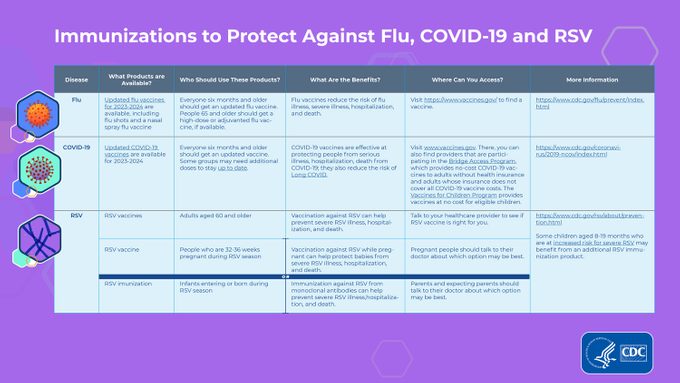These Are the 3 Vaccines You Need to Know About This Fall, Say Expert Doctors
Updated: Oct. 02, 2023

For some groups, infectious disease experts are recommending some vaccines this season for the first ever. Here's an official chart to help understand.
When cold and flu season arrived before 2019, most people—especially vulnerable adults and pregnant women—received just one seasonal flu vaccine. Now, for the first time ever, certain age groups and individuals with specific conditions may need to consider two additional vaccines to protect against some of the most aggressive seasonal viruses.
This year, the Centers for Disease Control and Prevention (CDC) recommends that everyone, with the guidance of their doctor, assess themselves and their children for vaccines against influenza, COVID, and Respiratory Syncytial Virus (RSV). The organization emphasizes that these vaccines offer the best protection against severe illness, hospitalization, and long-term issues, even if they do not prevent all infections.
The notice includes a useful chart that outlines who should receive each vaccine, but here is the general advice.
Flu
The CDC estimated that the 2022-2023 flu season resulted in tens of thousands of deaths and over 500,000 hospitalizations. Many of these could have been prevented through timely flu shots or nasal spray vaccines.
This flu season, the vaccine is recommended for almost everyone, from infants as young as six months to seniors. Individuals aged 65 and older should receive a high-dose or adjuvanted vaccine. (An adjuvant is an additive that helps enhance the vaccine’s effectiveness.)
Research: Doing This After Your Flu or COVID Vaccine Maximizes Your Immunity

COVID
As you may have heard, a new COVID variant called Eris has begun to spread in heightened numbers in September 2023, leading the CDC to recommend boosters for eligible individuals. A Pfizer or Moderna booster shot is recommended for everyone older than five years of age, while children aged six months to four years old require “multiple” doses as directed by a doctor. Immunocompromised individuals may need additional doses.
The CDC is also emphasizing the importance of pregnant women getting vaccinated or boosted, as it could help protect the baby through maternal antibodies. Boosters also play a crucial role in preventing long COVID, which can result in ongoing issues such as brain fog, vision problems, chest pain, and difficulty breathing.
Here’s the Arm You Should Get Your COVID Shot In, New Study Finds
RSV
If you’re not a parent of a young child, you might not be familiar with Respiratory Syncytial Virus or RSV, although RSV is increasingly common. RSV affects the respiratory system and lungs, similar to a cold, but it can lead to severe breathing difficulties in small children, sometimes requiring hospitalization. While it is most serious in children under one year old, RSV risks can be significant to older adults and individuals with compromised immune systems, according to the Mayo Clinic.
The CDC approved the first RSV vaccine for adults older than 60 years in April 2023. It now recommends that anyone older than age 60 should discuss the vaccine with their doctor.
Babies can also be protected from RSV in a couple of ways: Pregnant women should receive a dose between 32 and 36 weeks of pregnancy, which can prevent serious illness when their babies are born. Additionally, children aged eight months and under can be vaccinated as they enter RSV season.
These are general recommendations. Always speak with a licensed healthcare professional regarding your own healthcare needs, or your family’s.
















